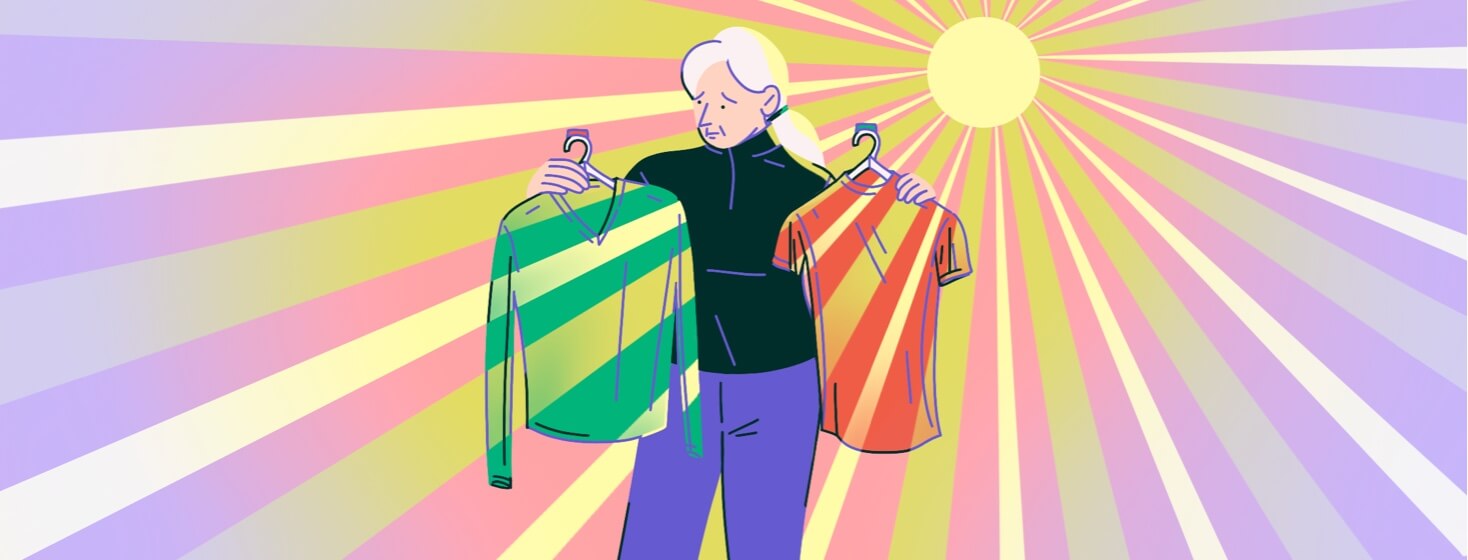The Search for the Perfect Shirt Continues
Saucony, a company known for its running shoes, also makes good running shirts. One of my favorite pieces of clothing is a gray cotton hoodie of theirs. I like the thumb holes that it easy to pull the sleeves over your hands.
Protecting my hands
Since I’ve had multiple skin cancers on my hands, it’s good for me to protect them while I am running. I do have sun protection gloves, but for some reason I only use them when playing tennis. There’s no law against wearing them while running, but I never think of it.
I got the shirt at a running store in Fairfield, Connecticut. I went back, but they didn’t have it, and I can’t find it online. (A lot of people, by the way, seem to be interested in the same type of shirt; a search for “long-sleeved shirt with thumb holes,” garners 9,030,000 results.)
I should have bought two
When my mother took me shopping back in the day, she would say, “take two” if I liked the shirt. It’s not a bad idea. But it was easier when my mother was treating.
Unfortunately, the cotton shirts that feel good don’t offer the best sun protection. I knew that serious runners prefer the synthetic “wicking” fibers that don’t absorb sweat as much. But I didn’t know about cotton being worse for sun protection until recently.
Cotton worse because it absorbs UV
The Skin Cancer Foundation says, “Unbleached cotton contains natural lignins that act as UV absorbers. Shiny polyesters and even lightweight satiny silks can be highly protective because they reflect radiation. High-tech fabrics treated with chemical UV absorbers or dyes prevent some penetration from UV rays.” 1
Side note: Raise your hand if you know what lignins are. Sounds like leggings, but obviously not that…Well, Websters says they are “an amorphous polymer related to cellulose that provides rigidity and together with cellulose forms the woody cell walls of plants and the cementing material between them.” 2
Still not much help! This explanation is clearer. They are “the dry matter in plants.”
The Skin Cancer Foundation explains why synthetic fibers are better. “Shiny polyesters and even lightweight satiny silks can be highly protective because they reflect radiation. High-tech fabrics treated with chemical UV absorbers or dyes prevent some penetration from UV rays. “On the opposite end of the spectrum are natural and lightweight fabrics (think: bleached or refined cotton, crepe, and silk), which tend to be thinner and let more light pass through.” 3
But cotton is more comfortable
But my cotton shirts are so much more comfortable that I wear them more often though I do mix in those that have a UPF factor. At least my cotton shirts are dark.
Say no to tennis whites
You know those tennis whites? They are the worst when it comes to sun protection. The Skin Cancer Foundation explains why dark colors are better: “Dark or bright colors, including red, black and navy blue, absorb more UV rays than lighter colors like whites and pastels. For example, an everyday white cotton T-shirt has a UPF of only about 5. As a rule of thumb, the more intense the hue, the better protection the clothing will provide.”
I have been searching for a dark blue, long-sleeved shirt exactly like the one my daughter got me at Target years ago. I like the way it covers my neck. You wouldn’t think it would be hard to find such a shirt.
It is so worn that you can barely see the name: Mossimo, the Target brand. Target dropped it in 2017 to carry other labels and then totally distanced itself three years later when the designer, Mossimo Giannulli, along with his wife, "Full House" star Lori Loughlin, was charged in the college admissions scam.
I bought another cotton shirt at Target, but it’s not as comfortable. The quest continues…

Join the conversation